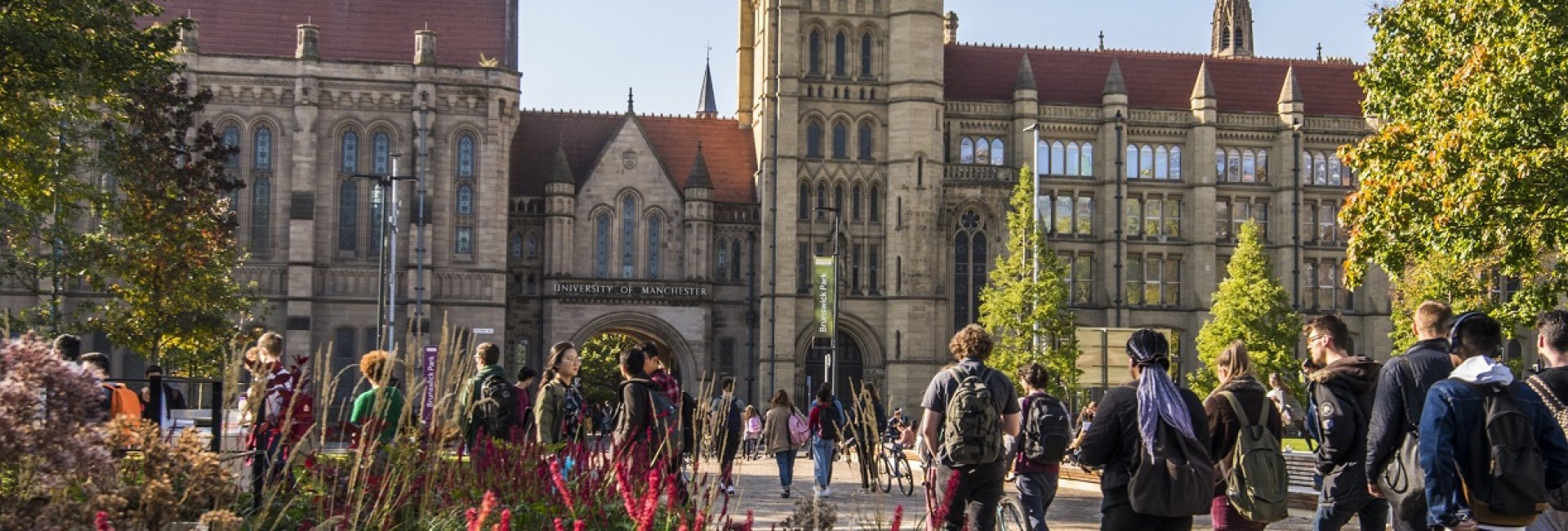The University of Manchester Open Day: in person / on campus
21 Jun 2025, 09:15
Manchester

This exciting undergraduate programme combines research-led teaching and real-world practice to empower students to become leaders, managers and practitioners in the creative and cultural industries. Rooted in the arts and humanities, the programme draws on interdisciplinary theoretical and practical approaches to working in the creative and cultural sectors, providing opportunities for creative management practice and professional experience, to foster critical thinking and employability skills for ethical and collaborative practice and worldwide application.
The creative and cultural industries include music, performing arts, museums and heritage, literary arts and publishing, digital media, film, TV, games, festivals, and fine arts, and all of the activities that are needed for their production and consumption. Defined by UNESCO as sectors of organised activity that have as their main objective the production or reproduction, the promotion, distribution or commercialisation of goods, services and activities of content derived from cultural, artistic or heritage origins, they are recognised world-wide for the contribution they make to economic development, placemaking and quality of life.
The Manchester base for this programme presents a unique offer for undergraduate study which will draw on the dynamic creative economy in the city-region and the research power and teaching excellence of the University, with particular focus on sector strengths in music, performing arts, publishing, screen and digital media. Students will hone their critical thinking and understanding of the histories and practices of creative and cultural sectors, whilst gaining sector-specific and transferrable skills in creative project development, management, leadership, and enterprise.
The programme provides progression from foundational theoretical perspectives and survey of industry sectors and strategies across the cycle of cultural production at the core of the first year, to the development of critical reflective practice and specialist options in the second year, culminating in research dissertation or the option of a large negotiated practical project in the final year. These core course units are accompanied by recommended optional units within the School of Arts Languages and Cultures and the chance to extend interdisciplinary learning in areas such as sustainability, leadership, and enterprise through UCIL units.
The programme also offers a year on industry placement as an option to gain further professional experience. Assessment practices combine formative points with self-evaluation through critical reflective practice and a range of summative group and individual assignments, reflecting the need for demonstration and application of knowledge and understanding in real-world contexts. Graduates will be equipped to enter freelance and portfolio careers, undertake project and business management and join established organisations in a range of roles, including public relations, communications and marketing, fundraising and development, rights management, creative producing, and content creation.

Learn what it's like to study at University of Manchester. From key stats to campus highlights, open days, and more - find everything you need to know here.
The following entry points are available for this course:
| Test | Grade | Additional details |
|---|---|---|
| IELTS (Academic) | 7 | 7.0 overall with no less than 6.5 in any one component |
Acceptable English Language Qualifications http://www.manchester.ac.uk/study/international/admissions/language-requirements/
We operate contextual admissions meaning many applicants receive an offer and are admitted at least one grade below standard entry requirements. Entry requirements for applicants meeting contextual admissions criteria are listed next to the standard entry requirements on course profiles.
Contextual admissions means we consider your application in context helping us to ensure everyone has a fair chance of getting into Manchester. The data we use is automatically provided on your UCAS form.
This section shows the range of grades students were previously accepted with - learn more. It is designed to support your research but does not guarantee whether you will or won't get a place. Admissions teams consider various factors, including interviews, subject requirements, and entrance tests. Check all course entry requirements for eligibility.
Students aged 17/18 who applied to this course were offered a place.
See how students with your grades have been accepted onto this course in the past.
| Location | Fee | Year |
|---|---|---|
| England | £9250 | Year 1 |
| Northern Ireland | £9250 | Year 1 |
| Scotland | £9250 | Year 1 |
| Wales | £9250 | Year 1 |
| Channel Islands | £9250 | Year 1 |
| Republic of Ireland | £9250 | Year 1 |
Tuition fee status depends on a number of criteria and varies according to where in the UK you will study. For further guidance on the criteria for home or overseas tuition fees, please refer to the UKCISA website.
Please see our website for the International Fees for each course.
Oxford Road
Manchester
M13 9PL
Visit our website Visit our course page
Email:study@manchester.ac.uk
Phone:+44 (0)161 275 2077